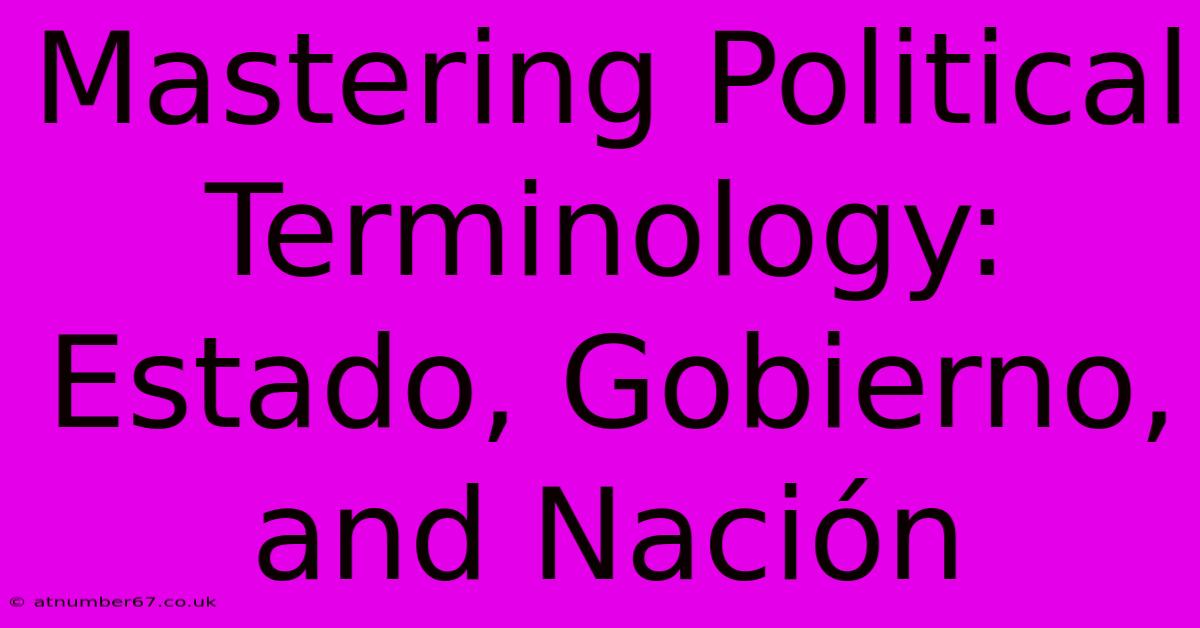Mastering Political Terminology: Estado, Gobierno, And Nación

Table of Contents
Mastering Political Terminology: Estado, Gobierno, and Nación
Understanding the nuances of political terminology is crucial for anyone seeking to engage deeply with political science, international relations, or even simply follow current events. In Spanish, the terms Estado, Gobierno, and Nación are often used interchangeably in casual conversation, but their distinct meanings are vital for accurate analysis. This article delves into the precise definitions of each term, highlighting their key differences and exploring their interrelationships.
Estado: The State – More Than Just a Government
The term Estado, often translated as "State," refers to the permanent political entity possessing a defined territory, a stable population, a government capable of exercising effective control over its territory and population, and the capacity to enter into relations with other states. It encompasses:
- Sovereignty: The Estado holds supreme authority within its borders, free from external interference. This is a defining characteristic.
- Territory: A clearly defined geographical area under its jurisdiction.
- Population: A permanent resident population that identifies with the State, though this can be complex and multifaceted.
- Government: The Estado possesses a government – but the government is part of the Estado, not the whole. The Estado persists even if the government changes.
- International Recognition: The Estado is recognized by other states as having the right to exist and represent its people on the international stage.
Key Differences from Gobierno and Nación
The Estado is not synonymous with the Gobierno (government) or the Nación (nation). It is the overarching structure that encompasses both. While the Gobierno might change frequently through elections or coups, the Estado remains. Similarly, a Nación might encompass multiple Estados (e.g., a nation spanning several countries) or be partially contained within a single Estado.
Gobierno: The Government – The Organ of the State
Gobierno, meaning "government," refers to the group of people who exercise political power within the State. This includes the executive, legislative, and judicial branches. The Gobierno is the mechanism through which the Estado implements its policies and exercises its authority. Its nature and composition vary drastically depending on a country's political system.
Understanding the Transient Nature of Gobierno
Unlike the Estado, the Gobierno is inherently transient. Governments are formed, reformed, and dissolved through elections, coups, or other political processes. The Estado endures regardless of the changes in the Gobierno.
Nación: The Nation – A Shared Identity
Nación, translating to "nation," denotes a group of people united by shared cultural characteristics, such as language, history, religion, or ethnicity. This sense of shared identity fosters a feeling of belonging and collective consciousness. A Nación is not necessarily tied to a specific territory or political structure.
Nation vs. State: Overlapping and Diverging Concepts
The relationship between Nación and Estado is complex. In some cases, there is a close alignment – a nation inhabiting a single state. However, in many instances, a Nación may be spread across multiple Estados (e.g., the Kurdish nation), or a single Estado may encompass multiple Naciones (e.g., many multinational states). This often leads to political tensions and conflicts.
Conclusion: Context is Key
Understanding the distinct meanings of Estado, Gobierno, and Nación is essential for accurate comprehension of political discourse in Spanish. While they may be used interchangeably colloquially, their precise distinctions are vital for a sophisticated understanding of political concepts like sovereignty, governance, and national identity. By recognizing the unique characteristics of each term and their interconnectedness, you'll unlock a deeper comprehension of political systems and international affairs. This nuanced understanding is not only crucial for academic pursuits but also allows for a more critical and informed engagement with the complexities of the modern political landscape.

Thank you for visiting our website wich cover about Mastering Political Terminology: Estado, Gobierno, And Nación. We hope the information provided has been useful to you. Feel free to contact us if you have any questions or need further assistance. See you next time and dont miss to bookmark.
Featured Posts
-
Sunil Shettys Son In Law A Modern Success Story
Apr 04, 2025
-
Son Doong Cave Beyond Your Wildest Dreams
Apr 04, 2025
-
Gary Sinises Son Finding His Own Identity
Apr 04, 2025
-
The Disdained Son In Law A Story Of Resilience
Apr 04, 2025
-
How Carl Lundstroem Built His Multi Million Dollar Fortune
Apr 04, 2025
